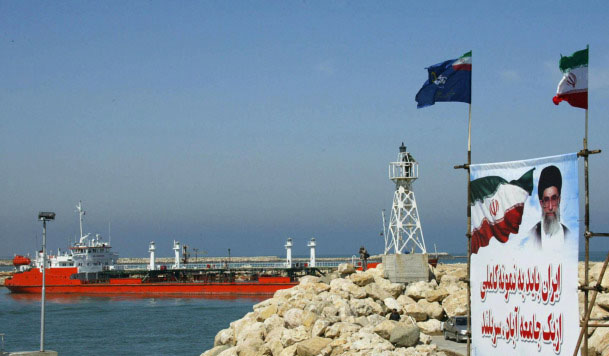IN THE MEDIA
Tough targeted sanctions needed against Iran
January 20, 2012 | Colin Rubenstein

Colin Rubenstein
Canberra Times – 20 January 2012
The International Atomic Energy Agency (IAEA) report released in November 2011 provides the strongest evidence to date that Iran has undertaken research and experiments geared towards developing nuclear weapons. And just last week, the IAEA confirmed that Iran was enriching uranium up to 20 percent, a major step toward weapons grade level, at an underground site at ‘Fordow’, a once-secret underground site revealed in September 2009 by the US, France and Britain.
Many in the international community were quick to condemn this news – including US Secretary of State Hillary Clinton as well as officials from France, Britain and Germany. Even Russia said it was concerned.
Why the growing alarm and action? Because Iran’s enrichment of uranium to 20 percent represents most of the work needed to get the uranium enriched to the level of 90 per cent or above required for atomic weapons. If Iran decides to turn that uranium into weapons it would take only about a month to achieve the 90 percent level. Iran is expected to have 4 to 5 bombs worth of 20 percent enriched uranium by the end of 2012.
The Iranian regime’s impulse for regional dominance coupled with its Shi’ite Islamist ideology makes its quest for nuclear weapons all the more alarming across the Middle East and globally. This includes a vision of the end of days, which will follow a catastrophic apocalypse, as well as a belief system that places a high value on martyrdom. This does not mean that Iran will necessarily use its nuclear capabilities to bring about such a catastrophe, but it makes this more likely – too likely to risk in the hope that deterrence or containment will be effective against such a nuclear armed regime.
Iran has threatened to ‘wipe Israel off the map’, but it is not only Israel that is concerned. The Gulf Cooperation Council (GCC), made up of Arab countries bordering the Persian Gulf, in December 2011 called on Iran to stop meddling in the internal affairs of GCC members and urged it to “fully cooperate” with IAEA. Underscoring the statement is the Gulf Arab region’s real fear that Iran is seeking regional hegemony and that if it were to obtain nuclear weapons it would also spark a regional arms race. Saudi Arabia has already indicated that they have plans to obtain a nuclear arsenal the moment Iran tests its first nuclear warhead. It would be surprising if the other powerful regional players – like Egypt, Turkey, Algeria and the Gulf Emirates – did not also follow suit. Unequivocally, if Iran were to obtain nuclear weapons it would dramatically accelerate nuclear proliferation and dramatically increase the prospect of a nuclear confrontation.
The fight to stop Iran’s development of nuclear weapons has so far been on two fronts – covert and diplomatic. Covertly, there are the attacks on nuclear scientists, explosions at Iranian nuclear and missile facilities, and the Stuxnet computer virus, designed to sabotage the Iranian nuclear program. Diplomatically, many in the international community – especially the US, EU, Canada and Australia – have strongly criticized Iran and applied harsher sanctions outside of the UN framework due to Russian and Chinese obstructionism.
Enhanced sanctions against the Iranian Central Bank, oil exports and refined oil imports backed by a credible threat of military intervention if sanctions were to fail remains the only viable strategy for putting pressure on Iran to pull back from the brink. The good news is that these sanctions appear to be having significant effects. Iran’s recent threat to close the Strait of Hormuz – even as a response to sanctions alone – together with its increasingly erratic behaviour, is telling! The Iranian national currency is falling, having lost 35 percent of its value since September 2011, prices are rising and while China (a large buyer of Iranian oil) has spoken out against the sanctions, in practice reports suggest that it has cut its oil imports from Iran and is driving a hard bargain on future oil purchases.
There are also reports that the Green protest movement, once thought to be crushed, is now reviving. And this is occurring at a time when threats of an imploding economy sparking regime change convulsions and a resurging opposition remains Teheran’s greatest worry.
Meanwhile the Saudis, profoundly worried about an Iranian nuclear bomb, have made it clear that they are ready and able to provide enough petroleum – up to 2 million barrels a day – to countries currently dependent on Iranian oil to cushion them from any economic shocks that tougher sanctions on Iran may trigger. Others have argued that another way to prevent economic shocks in oil markets would be to selectively choose targets for economic punishment thereby channeling Iran’s oil sales into a smaller pool of buyers. The reduced pool of buyers would allow purchasers of Iranian oil – such as China – to demand discounts. The aim would be to reduce Iranian oil revenue through fewer purchasers of Iranian crude and/or through drops in the price Iran receives per barrel.
Iran may only be months away from gaining nuclear weapons, and if it were to succeed it is likely to be nearly impossible to contain or deter the revisionist, theocratic and revolutionary regime in Teheran. Armed with nuclear weapons, it would pose grave threats not only across the Middle East but to global peace and security. Only the toughest, targeted sanctions backed by a credible military option have any chance of averting this potentially catastrophic outcome.
Dr Colin Rubenstein AM is the Executive Director at the Australia/Israel & Jewish Affairs Council
Tags: Iran





